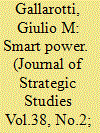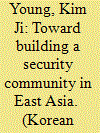| Srl | Item |
| 1 |
ID:
170986


|
|
|
|
|
| Summary/Abstract |
In the Norwegian-Swedish Union, Norway had home rule; the Swedish foreign minister conducted its foreign relations. This fact created the impression that Norway ‘played second fiddle’ in forging its relations with foreign Powers. This analysis contends that the organisation of the apparatus for policy-making secured Norwegian influence and interests in the Union’s foreign politics. It uses ‘concertmaster’ as an alternative metaphor to sum up the role of the Norwegian government in the king’s Norwegian foreign politics during the Union period. Whilst the king of Norway and Sweden’s authority dwindled as politicians in both countries limited royal powers and strengthened those of the Parliaments, the impression of Norway as the foreign political loser increased. In the context of growing European nationalism in the 1890s, the impression of Norway playing second fiddle shored up the radical opposition against the unpopular Union and led to its dissolution in 1905.
|
|
|
|
|
|
|
|
|
|
|
|
|
|
|
|
| 2 |
ID:
137255


|
|
|
|
|
| Summary/Abstract |
The analyses of smart and soft power have developed little beyond what their critics would refer to as ‘soft theory’, and in both cases the theoretical development is less than ‘smart’. This article attempts to address these deficiencies in the theoretical development of smart power by: (1) articulating a more rigorous and systematic understanding of the processes of smart power; (2) explaining how changes in world politics have raised the value of smart power relative to hard power; (3) analyzing smart power in the context of recent US foreign policy, and (4) proposing several prescriptions that will encourage decision-makers to value and effectively use smart power strategies in their foreign policies.
|
|
|
|
|
|
|
|
|
|
|
|
|
|
|
|
| 3 |
ID:
125254


|
|
|
|
|
| Publication |
2013.
|
| Summary/Abstract |
Despite the high-level economic interdependence and cultural exchange among major regional actors, the current security environment of Northeast Asia is rather volatile. The tension surrounding North Korean military aggression, the Taiwan Strait, and the East/South China Sea indicates the necessity of a security mechanism that restrains the aggressive actions of the regional actors involved. One viable option is to build a security community within which member states share an expectation of settling their differences through peaceful means. Based on an examination of the current state of security cooperation among South Korea, China, and Japan, this paper argues that the main impediment to a sustainable regional security community has been identity conflict caused by the history disputes among the three countries, not the lack of institutional settings or U.S. support. Shared identity and the concomitant mutual trust are prerequisites for genuine security cooperation. Therefore, this paper suggests the reconciliation process between South Korea and Japan as the initial step toward building an East Asian security community, paying attention to its implications for South Korea-China- Japan reconciliation.
|
|
|
|
|
|
|
|
|
|
|
|
|
|
|
|